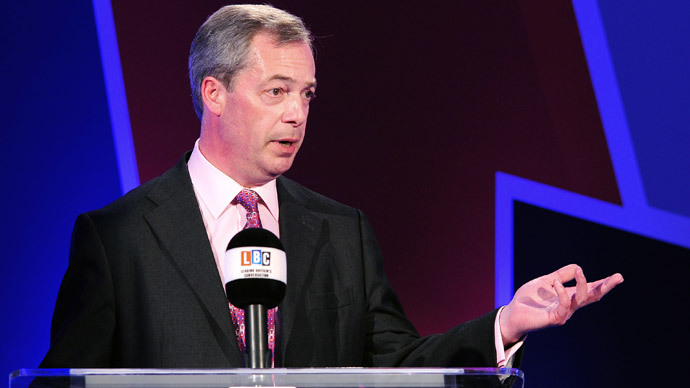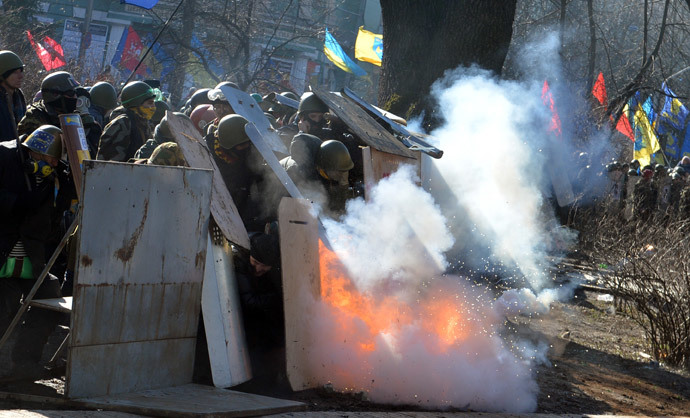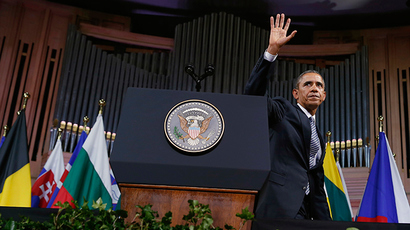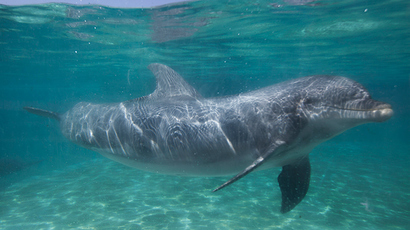EU has ‘blood on its hands’ over Ukraine – UKIP leader

The EU has blood on its hands after meddling in the Ukrainian crisis, once again revealing its imperial ambitions, Nigel Farage, leader of the euroskeptic UK Independence Party, said in a TV debate with Britain’s deputy PM, Nick Clegg.
With EU parliamentary elections scheduled for May, Farage and
Clegg clashed over the UK’s membership in the European Union in a
live televised debate Wednesday night on LBC Radio.
When the debate touched upon events in Ukraine, Clegg said that
he was proud of the EU for reaching out to ex-Communist states in
Eastern Europe and former “fascist dictatorships” on the
Mediterranean.
Those states only managed to turn into “democracies because
they became part of the family of nations within the EU,”
Clegg said.
But Farage responded with a completely opposite stance toward the
armed coup that ousted Ukrainian president Viktor Yanukovich in
late February.
“We should hang our heads in shame,” Farage said, adding
that it was the British government that had encouraged the EU to
pursue “imperialist, expansionist” ambitions in Ukraine.
"We’ve given a false series of hopes to a group of people in
western Ukraine and so geed up were they that they, actually,
toppled their own elected leader," he said.
With over 100 people killed during the Maidan standoff in Kiev,
the European Union “does have blood on its hands” over Ukraine,
Farage said.
“I don’t want a European army, navy, air force or a European
foreign policy. It has not been a thing for good in the
Ukraine,” he said.
A YouGov poll carried out immediately after the debate gave
Farage a landslide victory with 57 percent, while just 36 per
cent of respondents supported Clegg’s position.

The deputy PM accepted defeat as he appeared on LBC’s weekly
phone-in Friday morning, but hurried to make up for it by
attacking Farage over his remarks on Ukraine.
Clegg said he was “extraordinarily surprised, if not
shocked” to hear the claim that the EU was responsible for
the bloodshed in Ukraine.
“To suggest that somehow it is the EU's fault that the
Ukrainian people rose up, as many did on the streets of Kiev,
against their government seeking to claim greater democracy,
greater freedom, is such a perverse way of looking at
things,” he said.
Clegg said the UKIP leader’s words showed “quite how extreme
people can be… when their loathing of the EU becomes so
all-consuming that they even end up siding with Vladimir Putin in
order to make their point.”
Clegg promised that he would raise Ukraine again in his second
televised debate with Farage, due to take place next week.
The ultranationalist coup in Kiev led to the Crimean peninsula –
home to an ethnic Russian majority – holding a referendum on its
future within Ukraine.
On March 16, over 96 percent of Crimean voters decided to cut
ties with Kiev and rejoin Russia.
Crimea and the city of Sevastopol were officially accepted into
the Russian Federation on March 21, with President Vladimir Putin
signing a decree confirming the territories as part of Russia.
The EU and the US rejected the Crimeans’ right to
self-determination, criticizing the move and retaliated by
imposing travel bans and asset freezes on individual Russian
politicians and businessmen.
Clegg once again repeated the Western stance on the events in the
Crimea on LBC, saying that “what Vladimir Putin has done,
what the Russians have done – in effect annexing a part of
another country in the heart of Europe – is simply unacceptable
in this day and age.”
The popularity of UKIP, which stands for stricter immigration
policies and demands UK withdrawal from the EU, has been on the
rise in Britain in recent months.
The right-wing party produced the biggest surge for a fourth
party in British politics since the Second World War after coming
fourth in the number of council seats won and third in the
nationwide vote in the 2013 local elections.














